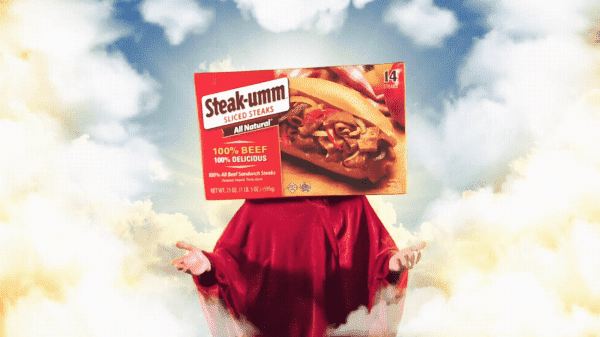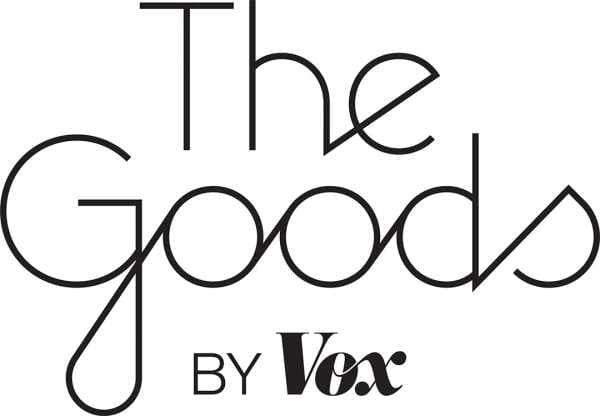

Steak-Umm — a Pennsylvania-based company that makes fast-cooking and heavily processed meat strips, sold in the freezer aisle at grocery stores — struck a nerve on Twitter Wednesday with a philosophical thread about the plight of millennials.
“Why are so many young people flocking to brands on social media for love, guidance, and attention?” wondered Steak-umm. “I’ll tell you why. They’re isolated from real communities, working service jobs they hate while barely making ends meat, and are living w/ unchecked personal/mental health problems.”
It was social analysis with meat puns. It went viral immediately. Over the next six tweets, Steak-umm went on to consider the toll of student debt, helplessness/loneliness, internet-induced isolation, and depression on the millennial psyche. In a meta twist, it even took on the effect of … marketing campaigns.
Millennials, the steak strips observed, “have had mass advertising drilled into their media consumption, and they’re being resold their childhoods by remakes, sequels, spinoffs, and other cheap nostalgia, making them more cynical to growth or authenticity.”
Cynical to growth or authenticity, perhaps, except if it’s coming from Steak-umm. Yoda-like, or vaguely stoned, the brand has in the past year established itself as the philosopher-poet of frozen meat sheets. But what feels fresh — authentic, even — about the voice is that it’s weird, or unexpected, or extremely open about the strangeness of being a personified brand. It’s the melancholy desperation. And it’s part of a deliberate strategy.
The anatomy of an existential steak tweet
As soon as the rant was posted, Jesse Bender, the account director at Allebach Communications, which handles Steak-umm’s branding for parent company Quaker Maid, got a call from Fortune. “The guy said, ‘I just want to see if you guys got hacked — was this an approved tweet?’ As much as people think that it came from left field, this is aligned with [our] voice,” he tells me.
Nathan Allebach, the 27-year-old social media manager who has become the voice of Steak-umm, has a theory of virality. Some food brand tweets, he says, go viral because “they do certain things that people don’t expect to see coming from a brand. There’s that shock: ‘Wow, I can’t believe a brand is saying this thing!’”
In the case of Steak-umm, though, the surprise is recognition: people seeing their innermost thoughts and fears reflected in the social media posts of a frozen-food brand. Since the tweets were posted, Allebach says, people are “just dumbfounded at the commentary and how they relate to it. I think at the end of the day, that’s what we’re trying to do.” Also, you know, sell steak.
“We’re trying to create meaningful content, so we’re not just posting nonsense,” he explains. “There’s some substance to it, but at the same time, it’s really lighthearted, and it’s centered around the community that we’ve built. We’re not taking sides or having a specific stance on anything.”
Yes, they’re talking about issues that are politics-adjacent — one might suggest that student debt and “unchecked personal/mental problems” are things that could have systemic solutions — but they’re not saying that, and they’re certainly advocating any particular stance. “We really want to be that sort of third way between a lot of the polarization that we see online,” Allebach explains.
According to him, the brand’s current voice was in fact developed, in part, as a response to trolling. (“There’s a certain subset of people who just don’t like brands on social media for whatever reason.”) Their now-trademark sign-off, “Steak-umm bless,” is intended as a strategy to “diffuse any type of tension.” The brand is a uniter, not a divider. It may have delivered “the most woke tweet rant of 2018,” but Steak-umm didn’t mean for it to be woke-woke. It’s not Nike here — it’s just a meat company with some things to say about post-recession ennui.
On Twitter, brands have feelings too
Steak-umm, of course, is not the only food brand trying to prove its chill authenticity on Twitter to capture a younger market. Fast-food chains, especially, have been successful at inserting themselves into the digital lives of consumers — often by stirring up drama with their anthropomorphized competitors and tapping into deep-seated customer loyalties. (Let us never forget the time Burger King “promposed” to Wendy’s, reigning champion of branded Twitter.)
Fast-food brands have adopted the social media personas of high school students, and it is just a matter of time until they all realize they are more the same than different at before-school detention. (In January, Steak-umm — already a favorite of weird Twitter — found itself in a fight with Wendy’s. Like everything else on the internet, it escalated quickly.)
Mostly, brand Twitter manifests as promotional information mixed with not especially successful humanoid dad-jokes — “early to bed, early to pancakes,” tweeted IHOP — but not always. Steak-umm is hardly the only food brand to get unabashedly weird. MoonPie, purveyor of decidedly un-hip graham cracker cookie sandwiches, has made waves with an aggressively internet-y persona. Like Steak-umm, MoonPie tweets exhibit a self-deprecating awareness that it is a brand advertising products. Also like Steak-umm, MoonPie’s tweets make varying degrees of sense.
What’s fascinating about Steak-umm tweetstorm, though, is that the sentiment is both dark and, more importantly, not particularly related to the product. It is not about eating. Minus the “Steak-umm bless” sign-off and the opening pun, it does not mention steak at all, -umm or otherwise. The closest equivalent may be the Twitter phenomenon Nihilist Arby’s, except in this case, it’s not parody. The nihilism comes from the brand itself.
The genius here is that it’s advertising, but it isn’t aspirational — like it says, millennials are too cynical for that. Instead, it mirrors our collective anxieties. People joke that the account is “one of Twitter’s therapists,” Allebach says, the frozen meat brand you go to for “life advice,” or “just to vent.” It’s not going to fix anything — it is, in its own words “a frozen meat company on Twitter” — but, you know, it hears you. The tweets don’t inspire cravings; they inspiring identification. Steak-umm is fed up too.
Steak-umm and the art of branded angst
Steak-umm’s recent rant isn’t the only time the company has won brand Twitter by capturing our collective angst. Last October, the company drummed up viral support when it launched an impassioned #VerifySteakUmm campaign after being denied the blue check mark five months in a row without explanation. (The account is now verified.)
Was it marketing? Sure. But also, Bender told the Philadelphia Inquirer at the time, they really did want to get verified. In the fall of 2017, the verification process — always shrouded in mystery — was an especially hot topic. First, Twitter was under fire for verifying assorted white supremacists. Then in response, the company paused the verification process altogether, so for at least part of the #VerifySteakUmm campaign, Steak-umm actually couldn’t get verified. “Waging a fruitless war,” Fortune pointed out, “is part of the joke for Steak-umm, which is tapping into a deeper well of user frustration and confusion.”
Maybe that’s the crux of it. Steak-umm does the jokes and memes and petty inter-brand feuds like the rest of brand Twitter — but it’s also willing to go dark. It is sometimes miserable, being a person. And Steak-umm is a brand that understands the marketing possibilities inherent in that. Not fixing your misery — lots of companies want to fix stuff — but seeing your misery. Identifying with your frustration.
This is sadness marketing at its finest. What matters isn’t whether beef sheets can solve your loneliness; what matters is that Steak-umm knows you’re lonely.
But Steak-umm, as Steak-umm is very aware, is still a brand trying to sell you a frozen meat product that, Eater observes, millennials aren’t necessarily likely to even want. And apparently, it’s working. “We haven’t done a whole lot different in previous years in terms of traditional marketing,” says Joey Piazza, the director of marketing at Quaker Maid. “And sales are up double digits across the board … we’re reaching a new audience that we haven’t in the past.”
Sourse: vox.com






